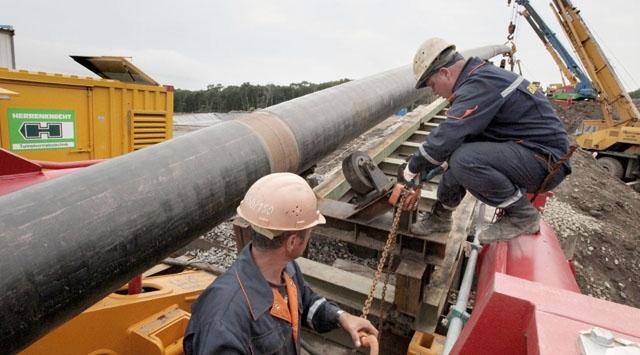
BULGARIA: DOUBLE LOSING

The Bulgarian government finds itself in a position where it needs to secure long-term reliable natural gas supplies, after two successive failures in the past few years to get involved in major infrastructure projects, namely the Nabucco and the South Stream pipelines.
During recent discussions with Slovakia and Central European countries, Bulgarian Foreign Affairs Minister Daniel Mitov initiated negotiations include his country in the so-called "EastRing" gas networking infrastructure. EastRing aims to interconnect all countries from the Black Sea up to the Baltic Sea in order to reduce uncertainties in the Eastern European gas market.
According to the Bulgarian point of view, Bulgaria will connect itself with the newly proposed Turkish Stream (Turk Stream) pipeline project, which will then shift north and eastwards, thus creating a natural gas hub in its territory, a long-sought goal. Moreover, stronger interconnections with Turkey would allow Bulgaria to diversify in the mid-term its overall supplies by acquiring not only Russian but also Azeri, Iranian and even LNG-sourced gas from the Turkish transmission system.
Bulgaria, Slovakia, Romania and Hungary are close to signing a memorandum of cooperation for the EastRing project, which envisages a maximum capacity of 40 bcm per annum and can be classified as a large project in a pan-European level. Concurrently the Bulgarian administration strives to forge an solid alliance with Azerbaijan's SOCAR and mulls that a resurrection of Nabucco is on the table, without specifying on the numbers and timetables likely involved.
It has to be noted that SOCAR is determined so far to proceed with its supplies to Turkey and fill in the Trans-Anatolian Pipeline (TANAP) and Trans-Adriatic Pipeline (TAP), with the likely inclusion of the proposed Ionian-Adriatic Pipeline (IAP). Based on the amounts that can be extracted by the Azeri fields and also the domestic consumption trends, it is highly unlikely that the EastRing could have any meaningful supply by Azerbaijan and for the long-term. For the moment, Bulgaria has a pending 1 bcm per annum import contract with Azerbaijan to be enacted after 2020 that would be sourced mainly via the Interconnector Greece-Bulgaria (IGB) which is planned to be ready by that time. Other than that there are no secure supplies or even agreements for larger quantities.
Furthermore, the EU Commission itself has left a window of opportunity open for Gazprom to fill in supplies for the TAP project, which basically means that Bulgaria would be heavily dependent on Russian gas in any case and for the long-term. Additionally, the project will require large-scale interconnection infrastructure and underground storage facilities in all participating counties, plus their immediate neighbours at least, something which requires significant capital and most importantly political will and consensus, which is hard to be achieved since there are many divergent energy interests.
Croatia, for example, has its own national policy that aims to secure supplies via the proposed Krk LNG facility and the aforementioned IAP route. Serbia itself leans into getting involved in the Turkish Stream, hoping that a spur from Greece via FYROM will reach its territory. Hungary has already aligned itself with Gazprom and got an impressive gas price reduction, whilst Austria has a strategic aim to enhance the Baumgarten's gas hub significance which can only be achieved by pragmatic and grand pipeline projects.
All in all, Bulgaria is at a crucial stage where it has to get into terms that it is extremely difficult to achieve its role as a regional hub, while it does not participate physically in any project of tangible value. It is likely that sooner or later Sofia will raise its voice in order to involve itself in the Turkish Stream project, which is the only proposed pipeline that could terminate right at its doorstep and aims to bring about 40 bcm of gas per year for European deliveries.
That potential move of course will not decrease Bulgaria's dependence on Russian imported gas, but there is only one alternative for Bulgaria to really diversify its imports. That is to align itself with Greece and head into the international LNG market by which Greek ports will be used for mass introduction of LNG into Bulgaria.
The above opportunity nevertheless is not really sought by Sofia for basically three reasons. Firstly, it will depend itself to Greece, instead of Russia and the former does not really have to offer any political-geostrategic advantages that potentially Moscow could offer. Secondly, LNG price tends to fluctuate and in particular periods it could be much more expensive than Russian pipeline transferred gas. Thus despite Greek DEPA's continuous and long-term offers to the Bulgarian side, the latter was reluctant to really get involved in such a project. Lastly, Greece itself views Turk Stream positively in principle, while it has already secured a place in TAP, leaving presently LNG option as a secondary one if all other plans go awry.
It can be safely estimated that it is a matter of time, before Bulgaria officially acknowledges its intention of joining Turkish Stream either as an integral part or as a junior partner. In that sense both South Stream and Nabucco will be in sort resurrected and embodied into one single route.
naturalgaseurope.com





